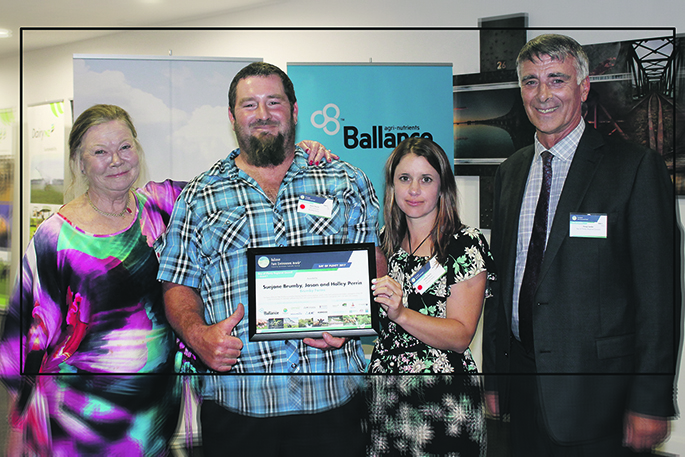Farmers and growers are coming under increasing fire over water quality issues but the focus also needs to go on urban residents, Bay of Plenty Regional Council Chairman Doug Leeder says.
“In the Bay of Plenty, 86 per cent of our rivers are swimmable but some of the worst quality water is in Auckland and after heavy rain it seem acceptable that some Wellington beaches are closed because of infiltration of sewerage into the storm water systems.”
Doug Leeder, chairman of the Bay of Plenty Regional Council (far right) with Suejane Brumby, Jason and Holley Perrin, of Brumby Farms, Waihi who won
the Bay of Plenty Regional Council Environment Award.
The debate following the February announcement of the Government’s target that 90 per cent of New Zealand’s lakes and rivers meet swimmable water quality standards by 2040 unfairly focused on the rural sector, Doug told those attending the Ballance Farm Environment Awards dinner in February 24.
How to share the costs of implementing the Government’s water quality plans between local and central government needs to be debated, he says.
Acknowledging that there is still much to do to improve water quality, Doug says more recognition needs to be given to the considerable work already done and continuing to be carried out by farmers and growers.
“The challenges for this district (Bay of Plenty) will get harder, rather than easier.” The entrants in this year’s award and those who have gone before them, are the early adopters of positive change, he says.
Widening gap
Doug’s concerns are shared by Jim Hitchcock, chairman of the Bay of Plenty Ballance Farm Environment Awards Trust who says the widening urban rural gap in New Zealand means few city residents know what is really happening on the land.
“Those in the main stream media have little understanding of the real issues, but they influence people’s views of our sector. The majority of readers don’t want good news stories.”
The Bay of Plenty and other regional farm environment awards are all about the good stories of what is happening on farms and orchards – stories Jim says need to have a wider hearing.
Greg Delaney, General Manager at Ballance Agri-Nutrients Ltd says despite predictions of gloom and doom, farms will survive and continue to produce food in an environmentally and economically sustainable manner through innovation, precision agriculture and hard work.
Pride in sector
Today’s most profitable farmers are those who have the strongest focus on the environment he says.
Simon Stokes, of the New Zealand Farm Environment Trust says it is vital to build pride into the rural sector and share the positive stories of farmers and growers with other audiences.
The Ballance Farm Environment Awards, administered by the New Zealand Farm Environment Trust, aim to do just that, he says.
Margaret Wright, judging co-ordinator for the Bay of Plenty Farm Environment Awards says she is concerned about surveys such as the one which showed nearly 60 per cent of respondents deemed farming to be one of the three main causes of damage to freshwater, with the others being sewage and stormwater, and industrial activities.
What is overlooked, she says, is the impact of urban residents on water quality, and the waste they generate which goes to landfill.
Farmer and growers who enter the farm environment awards are doing the right thing not only by the land but also by their industries, by showcasing the good stories about what is happening in the rural sector, says Margaret.
The New Zealand Farm Environment Trust is an independent entity, which seeks to promote leadership in environmental excellence and encourage the uptake of management practices which both protect and enhance the environment and add value to farming businesses and communities.



0 Comments
Leave a Comment